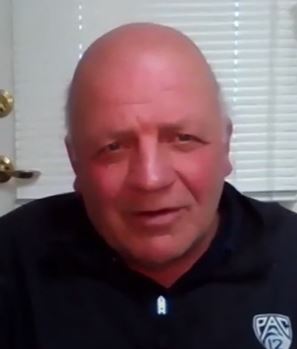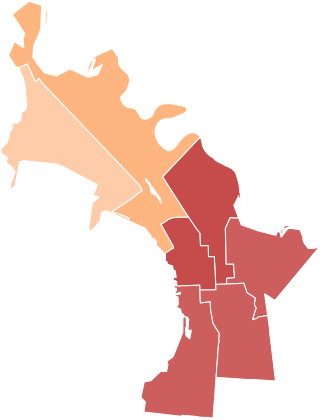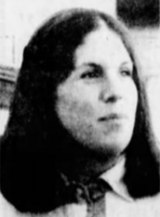The Vermont Progressive Party, formerly the Progressive Coalition and Independent Coalition, is a political party in the United States that is active in Vermont. It is the third-largest political party in Vermont behind the Democratic and Republican parties. As of 2023, the party has one member in the Vermont Senate and five members in the Vermont House of Representatives, as well as several more affiliated legislators who caucus with the Democratic Party.

The 2006 United States Senate election in Vermont was held November 7, 2006. Incumbent independent Senator Jim Jeffords decided to retire rather than seek reelection to a fourth term, and Bernie Sanders was elected to succeed him.

Terrill G. Bouricius is an American politician who served in the Vermont House of Representatives from the Chittenden-7-4 district from 1991 to 2001, as a member of the Vermont Progressive Party. Prior to his tenure in the state house, he served on the city council in Burlington, Vermont, from 1981 to 1991, from the 2nd district, and served as president of the city council.

The 1990 United States House of Representatives election in Vermont was held on Tuesday, November 6, 1990, to elect the U.S. representative from the state's at-large congressional district. The election coincided with the elections of other federal and state offices.

The 1986 Vermont gubernatorial election took place on November 4, 1986. Incumbent Democrat Madeleine Kunin ran successfully for re-election to a second term as Governor of Vermont, defeating Republican candidate Peter Plympton Smith and independent candidate Bernie Sanders. Since no candidate won a majority of the popular vote, Kunin was elected by the Vermont General Assembly per the state constitution.

The 1988 United States House of Representatives election in Vermont was held on November 8, 1988. Republican nominee Peter Plympton Smith defeated Independent candidate Bernie Sanders and Democratic nominee Paul N. Poirier.

The 1992 United States House of Representatives election in Vermont was held on Tuesday, November 3, 1992, to elect the U.S. representative from the state's at-large congressional district. The election coincided with the elections of other federal and state offices, including a quadrennial presidential election and an election to the U.S. Senate.

The 1981 Burlington mayoral election was held March 3, 1981. Bernie Sanders, who ran as an independent candidate, defeated incumbent Democratic Mayor Gordon Paquette, who was seeking a sixth term as Mayor of Burlington, Vermont, and Richard Bove.

The 1983 Burlington mayoral election was held March 1, 1983. Incumbent Mayor Bernie Sanders won with 52.12% of the popular vote against Democratic nominee Judith Stephany and Republican nominee James Gilson.

The 1985 Burlington mayoral election was held March 5, 1985. Incumbent Mayor Bernie Sanders won with 56.09% of the popular vote against Democratic nominee Brian D. Burns, independent Diane Gallagher, and various other minor candidates.

The 1987 Burlington mayoral election was held on March 3, 1987. Incumbent Mayor Bernie Sanders won election to his fourth and final term as mayor with 55.23% of the popular vote against Democratic nominee Paul Lafayette, a member of the city council.

The 1989 Burlington mayoral election was held on March 3, 1989. Incumbent Independent Mayor Bernie Sanders did not seek reelection to a fifth term. Peter Clavelle ran as an independent candidate, with the support of the Progressive Coalition, and defeated Democratic nominee Nancy Chioffi.

Carina Nicole Driscoll is an American politician who served in the Vermont House of Representatives from Chittenden County from 2001 to 2003, as a member of the Vermont Progressive Party. She also served on the city council in Burlington, Vermont, and unsuccessfully sought the city's mayoralty in the 2018 election.

Gordon H. Paquette was an American politician who served as the 36th Mayor of Burlington, Vermont from 1971 to 1981, when he was defeated by future United States Senator and presidential candidate Bernie Sanders in the latter's first electoral victory.
Peter C. Brownell is an American politician who served as the 39th Mayor of Burlington, Vermont. Prior to his tenure as mayor he was active in local politics with him serving on the school board and the city council. After his tenure as mayor he served in the Vermont Senate. He is the most recent Republican elected as mayor of Burlington.

Bernie Sanders served as the 37th Mayor of Burlington, Vermont, from April 6, 1981, to April 4, 1989. Sanders' administration was the first socialist one in New England since the mayoralty of Jasper McLevy. He was regarded as a successful mayor that instituted multiple economic policies in Burlington, and was selected as one of the twenty best mayors in the United States by U.S. News & World Report in 1987. He was active in foreign affairs, primarily in Latin America in which he criticized the policy of the United States and visited Cuba, Nicaragua, and the Soviet Union, and was criticized for it by his opponents.

The 1993 Burlington mayoral election was held on March 2, 1993. Republican nominee Peter Brownell defeated incumbent Progressive Coalition Mayor Peter Clavelle.

On March 7, 2006, a mayoral election was held in Burlington, Vermont, United States. Incumbent Mayor Peter Clavelle declined to seek reelection and Progressive nominee Bob Kiss was elected to succeed him.

On March 7, 1995 a mayoral election was held in Burlington, Vermont, United States. Progressive Coalition nominee Peter Clavelle, the former mayor who had lost reelection in the 1993 election, defeated incumbent Republican Mayor Peter Brownell, Democratic nominee Paul Lafayette, and other candidates.

The 2022 Vermont Senate election took place on November 8, 2022, as part of the biennial United States elections. The election coincided with elections for other offices including the U.S. Senate, U.S. House, Governor, and State House. Vermont voters elected all 30 state senators from 16 districts, with each district electing between one and three senators. State senators serve two-year terms in the Vermont Senate. Primary elections were held on August 9, 2022. This election would be the first to use new districts adopted by the Vermont General Assembly to allocate for population changes across the state after the 2020 census.














